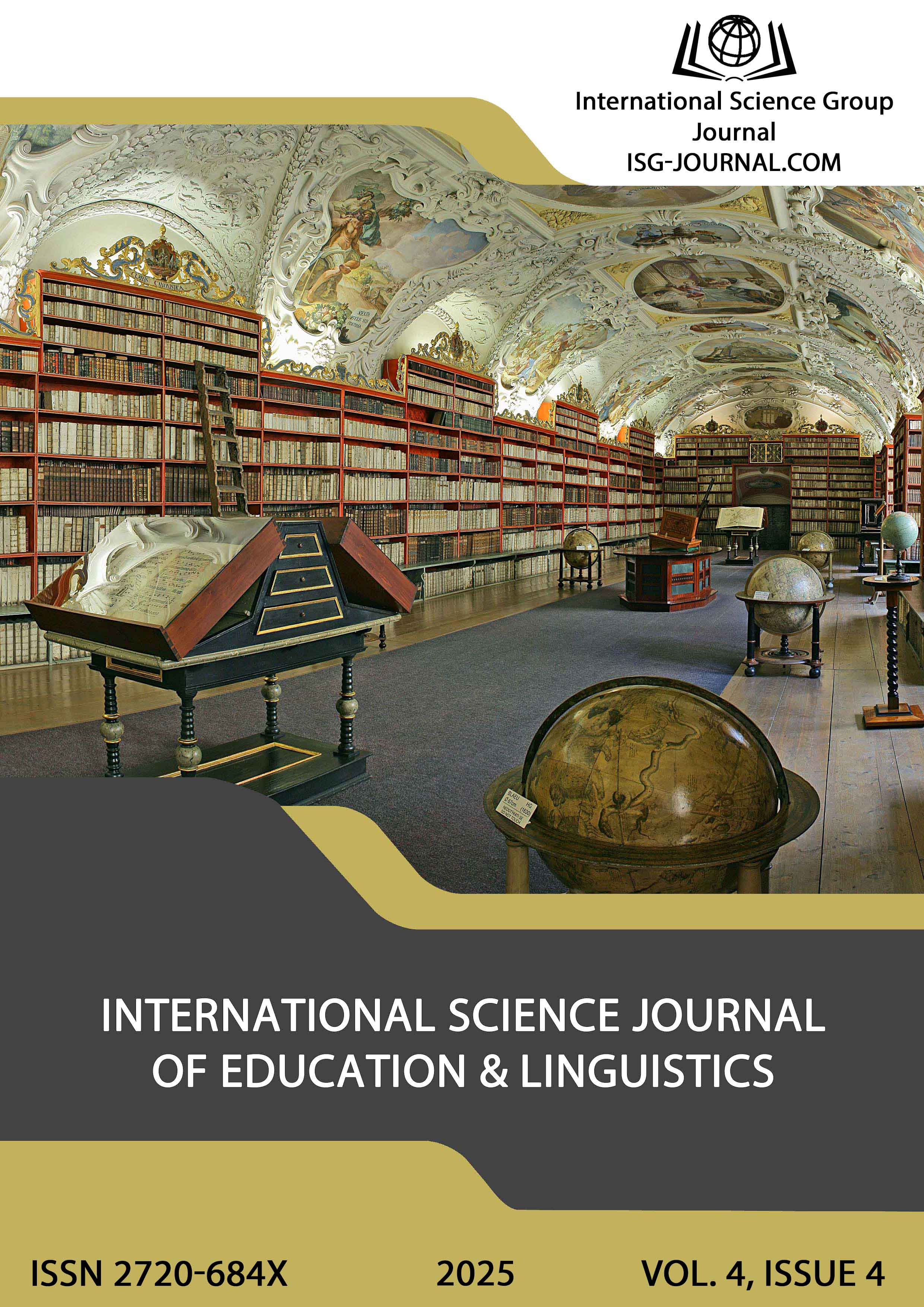Evaluating AI-powered platforms and tools for autonomous phrasal verb acquisition in higher education
DOI:
https://doi.org/10.46299/j.isjel.20250404.04Keywords:
phrasal verbs, artificial intelligence, educational technology, language acquisition, higher education, online platformsAbstract
The article critically examines the evolving landscape of digital tools and Artificial Intelligence (AI) platforms as indispensable resources for university students engaged in self-directed learning of English phrasal verbs. We acknowledge the inherent complexities of phrasal verbs, including their idiomatic nature, polysemy, and context-dependent usage, which often pose significant challenges for non-native speakers beyond traditional rote memorization. The study analyzes the pedagogical benefits and limitations of various popular platforms, specifically Quizlet and Memrise for structured vocabulary acquisition and spaced repetition, YouGlish and Reverso Context for contextual immersion and authentic usage, and Grammarly for active production and error correction in written output. Furthermore, it broadly considers the potential of AI-driven adaptive learning systems to personalize instruction and address individual learning gaps. While highlighting the enhanced accessibility, personalized feedback, and engaging learning experiences offered by these technologies, the article also addresses crucial considerations such as the need for critical digital literacy, the potential for over-reliance on technology, and persistent issues of data privacy and equitable access. Ultimately, the work advocates for a strategic, integrated approach where students leverage a diverse array of digital companions to move beyond passive recognition towards confident and productive mastery of English phrasal verbs, emphasizing that these tools augment rather than replace fundamental linguistic understanding and human interaction in language acquisition. The comprehensive analysis aims to provide both educators and students with practical insights into optimizing the use of modern technology for effective language learning, fostering greater autonomy and proficiency in English. It underlines that successful phrasal verb acquisition in the digital era necessitates not just access to tools, but also a nuanced understanding of their specific strengths and weaknesses, allowing for a tailored and highly efficient learning journey that moves beyond surface-level memorization to deep contextual comprehension and fluent application.References
Esmaeili, Z., & Shahrokhi, M. (2020). The Impact of Memrise application on Iranian EFL learners’ collocation learning and retention. International Journal of Language Education, 4(2), 221–233.5 https://doi.org/10.26858/ijole.v4i2.10672
Abarghoui, M. A., & Taki, S. (2018). Measuring the effectiveness of using “Memrise” on high school students’ perceptions of learning EFL. Theory and Practice in Language Studies,1 8(12), 1758. https://doi.org/10.17507/tpls.0812.25
Abolina, A., & Mežinska, S. (2024). The application of artificial intelligence tools in higher education: opportunities and challenges. Society. Integration. Education. Proceedings of the International Scientific Conference, 1, 57–71. https://doi.org/10.17770/sie2024vol1.7844
Anindyajati, Y. R., & Choiri, A. S. (2017). The effectiveness of using Wordwall Media to increase science-based vocabulary of students with hearing impairment. European Journal of Special Education2 Research, 2(2), 1–13. https://doi.org/10.5281/zenodo.236877
Dizon, G. (2016). Quizlet in the EFL classroom: Enhancing academic vocabulary acquisition of Japanese university students. Teaching English with Technology, 16(2),4 40–56.
Barr, B. W. B. (2016). Checking the effectiveness of Quizlet as a tool for vocabulary learning. The Center for ELF Journal, 2(1), 36–48.3
Enayati, F., & Gilakjani, A. P. (2020). The Impact of Computer Assisted Language Learning (CALL) on improving Intermediate1 EFL learners’ vocabulary learning. International Journal of Language Education, 4(1), 96–112. https://doi.org/10.26858/ijole.v4i2.10560
Łuczak, A. (2017). Using Memrise in Legal English Teaching. Studies in Logic, Grammar and Rhetoric, 49(1), 141–152. https://doi.org/10.1515/slgr-2017-0009
Fadhilawati, D. (2016). Learning and reviewing vocabulary through Memrise to improve students’ vocabulary achievement. Journal of Academic Research and Sciences6 (JARES), 1(2), 4. https://doi.org/10.30957/jares.v1i2.419
Fadhilawati, D., & Sari. (2018). Embedding various digital technologies in English teaching and learning to improve students’ vocabulary and writing. Langlit, 5 (December), 170–184.7
Guan, C., Mou, J., & Jiang, Z. (2020). Artificial intelligence innovation in education: A twenty-year data-driven historical analysis. International8 Journal of Innovation Studies, 4(4), 134–147.9 https://doi.org/10.1016/j.ijis.2020.09.001
Hadiat, A. (2022). The use of Grammarly to enhance students' accuracy in writing descriptive text. Journal of English Education Program (JEEP).10 https://doi.org/10.25157/(jeep).v9i2.8552
Kannan, J., & Munday, P. (2018). New trends in second language learning and teaching through the lens of ICT, networked learning, and artificial intelligence. 11 Círculo de Lingüística Aplicada a la Comunicación.12 https://doi.org/10.5209/CLAC.62495
Lam, E. T. C., Wang, L. C. C., & Zhao, X. W. (2018). Students’ perception of Quizlet as a Chinese learning tool: A preliminary study. International Journal of Technology Enhanced Learning, 10(1–2), 128–136.13 https://doi.org/10.1504/IJTEL.2018.088342
Lander, B. (2016). Quizlet: What the students think – A qualitative data analysis. CALL Communities and Culture – Short Papers from EUROCALL 2016, 254–259.14 https://doi.org/10.14705/rpnet.2016.eurocall2016.571
Pokrivcakova, S. (2019). Preparing teachers for the application of AI-powered technologies in foreign language education. Journal of Language and Cultural Education, 7(3), 135–153.15 https://doi.org/10.2478/jolace-2019-0025
Topal, I. (2023). YouGlish: A web-sourced corpus for bolstering L2 pronunciation in language education. Journal of Digital Educational Technology, 3, ep2305. https://doi.org/10.30935/jdet/13236
Woo, J. (2018). Oxford Learner’s Bookshelf: An e-book reader application for extensive reading. University of Hawaii National Foreign Language Resource Center, 30(2), 240–245. https://doi.org/10125/66926
Yalcinalp, S., Türkoğlu, H., Engin Koc, S., & Ersoy, H. (2024). Utilization of Artificial Intelligence in education: A perspective on learning strategies. IntechOpen. https://doi.org/10.5772/intechopen.1005086
Woo, J., & Choi, H. (2021). Utilizing machine translation systems to generate word lists for learning vocabulary in English. Journal of Digital Contents Society, 22(1), 71–75. https://doi.org/10.9728/dcs.2021.22.1.71
Woo, L., & Choi, H. (2021). Systematic review for ai-based language learning tools. https://www.researchgate.net/publication/356026044_Systematic_review_for_AI-based_language_learning_tools
Downloads
Published
How to Cite
Issue
Section
License
Copyright (c) 2025 Alla Shykun

This work is licensed under a Creative Commons Attribution 4.0 International License.





